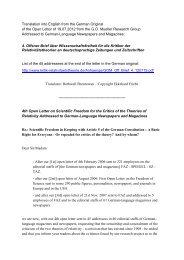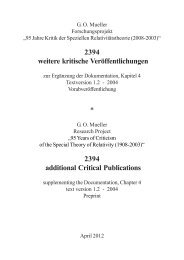1. The Need of New Approaches - Kritische Stimmen zur ...
1. The Need of New Approaches - Kritische Stimmen zur ...
1. The Need of New Approaches - Kritische Stimmen zur ...
You also want an ePaper? Increase the reach of your titles
YUMPU automatically turns print PDFs into web optimized ePapers that Google loves.
Chapter 9: <strong>The</strong> Thought Experiment<br />
351 / 2003-11-19 - SOCIAL TEXT, Editorial Office. Centre for the Critical Analysis <strong>of</strong> Contemporary Culture,<br />
Rutgers State University. <strong>New</strong> Brunswick, NJ.<br />
STR Research Report, Nov. 03<br />
Extract:<br />
“<strong>The</strong> situation is rather bizarre: while in all other fields <strong>of</strong> science there is permanent criticism and discussion <strong>of</strong><br />
theories, only in theoretical physics there has been organized the silence <strong>of</strong> a cemetary to protect relativity theory<br />
from critical arguments, and still more bizarre is that nobody in the sciences and the history <strong>of</strong> sciences seems to<br />
have noticed this cultural disaster.<br />
Since the special theory <strong>of</strong> relativity in the public opinion has survived until today as one <strong>of</strong> the greatest<br />
achievements <strong>of</strong> science, in reality it has been disproved since at least 1914 (experiment <strong>of</strong> Sagnac), and the few<br />
features <strong>of</strong> the theory which have a basis in reality (as example: e=mc²) are no relativistic effects and the famous<br />
formula is not the idea <strong>of</strong> Einstein: the relativists simply have usurped the achievement <strong>of</strong> Thomson 1881, Wien<br />
1900, Poincaré 1900 and 1904, Kaufmann 1901-05, Hasenöhrl 1904 (see our documentation pages 131-132). -<br />
<strong>The</strong> ruins <strong>of</strong> the theory are covered by social constructions as the cult <strong>of</strong> genius and the powerful suppression <strong>of</strong><br />
any criticism and even the critics as persons, and relativity theory thus has become a theory <strong>of</strong> simple sociophysics.<br />
<strong>The</strong> pro<strong>of</strong>s and details <strong>of</strong> this diagnosis - physical and historical - you will find in our documentation. (...)<br />
We are aware <strong>of</strong> your dispute with certain representatives <strong>of</strong> the sciences (Alan Sokal). We know the German<br />
edition <strong>of</strong> the book<br />
A. Sokal, J. Bricmont: Fashionable nonsense. 1998<br />
under the title „Eleganter Unsinn“, München: Beck 1999.<br />
In the German edition there is a chapter (no 12) which was part <strong>of</strong> the French edition, but not in the original<br />
English edition, and therefore has been translated from the French.<br />
This is a very interesting fact because this chapter is dedicated to Henri Bergson, who was one <strong>of</strong> the best and<br />
sharpest critics <strong>of</strong> relativity theory since 1922 (Durée et simultanéité). In our German edition this chapter fills the<br />
pages 206-228: these are 25 pages exclusively about the criticism against the special relativity theory, and are a<br />
condemnation <strong>of</strong> any criticism as stupid and outdated.<br />
<strong>The</strong> addition <strong>of</strong> this Bergson chapter is interesting because Bergson was no post-modernist and no structuralist<br />
and no contemporary <strong>of</strong> the criticized sociologists.<br />
Let‘s summarize the themes <strong>of</strong> this book <strong>of</strong> Sokal/Bricmont:<br />
- with Lacan they criticize his mathematics,<br />
- with Kristeva they criticize her logic and mathematics,<br />
- with Feyerabend they criticize his methodological relativism <strong>of</strong> „anything goes“,<br />
- with Bloor, Latour they criticize the „strong programme“,<br />
- with Irigaray her hydro-mechanics,<br />
- Chapter 6 (page 145-154): Latour they criticize for his misunderstanding <strong>of</strong> relativity theory and use <strong>of</strong><br />
relativity theory for non-physical objects;<br />
- Chapter 7 deals with chaos theory; Chapter 8: Baudrillard; Chapter 9: Deleuze and Guattaris book „What is<br />
philosophy?“;<br />
- Chapter 10: Virilio they criticize for his misunderstanding <strong>of</strong> relativity theory;<br />
- Chapter 11: Gödel and mathematics.<br />
What does this overview <strong>of</strong> the book‘s content until chapter 11 show? Only chapter 6 and 10 treat among other<br />
subjects the relativity theory, and the cited authors (Latour, Virilio) with no word criticize the relativity theory,<br />
only misunderstand and make wrong use <strong>of</strong> the theory. This is the result for the reader <strong>of</strong> the English version <strong>of</strong> the<br />
book.<br />
Only in the French version for a French public with knowledge <strong>of</strong> Bergson‘s work which carries a strong<br />
criticism <strong>of</strong> the relativity theory the authors think it useful to strengthen relativity theory by reducing Bergson to a<br />
blockhead in physics. To the first purpose <strong>of</strong> the book - criticism <strong>of</strong> sociological and epistemological relativism -<br />
there is added a completely new second purpose: calumny <strong>of</strong> criticism <strong>of</strong> the relativity theory. This new second<br />
purpose remains in the German edition.<br />
This is the second reason that we think our documentation may be <strong>of</strong> interest to your Journal. You probably will<br />
find out quickly why the American reader has not been confronted with Bergson‘s criticism <strong>of</strong> relativity theory.<br />
We are convinced that a journal like SOCIAL TEXT has the influence to start a discussion in America about<br />
the suppression and slander against criticism in theoretical physics: this suppression and slander we judge to be a<br />
cultural disaster. A discussion in America will spread to the European countries where the situation <strong>of</strong> theoretical<br />
physics is similar.<br />
70<br />
G. O. Mueller: STR 2012





